June 21-30, 2015 - ENABLE
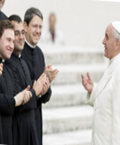 The Second Vatican Council says that the common priesthood of the baptized faithful and the ordained ministerial priesthood are “ordered to each other.” They both share in the one priesthood of Jesus Christ. What does this mean?
The Second Vatican Council says that the common priesthood of the baptized faithful and the ordained ministerial priesthood are “ordered to each other.” They both share in the one priesthood of Jesus Christ. What does this mean?
One way to understand this relationship of ordained priests and all the baptized is see how ordained priests serve the faithful. Obviously, priests exercise particular functions, such as preaching, celebrating the sacraments, and governing the Church. But there is something more at work. In exercising these particular functions on behalf of their people, ordained priests enable those who share in the common priesthood to exercise their priesthood. By offering word, sacrament, and church life, ordained priests bring to all the baptized faithful the necessary means for them to live in the world and bring the saving mystery of Jesus Christ to a world in deep need of its savior. Ordained priests, in other words, enable all the baptized to be the priests that God wants them to be.
June 14-20, 2015 - STAND
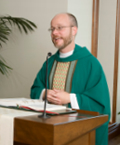 Although priests do many things - teach, celebrate sacraments, and govern the Church, their core identity, as the Second Vatican Council described it, means that they act in the name and person of Jesus Christ, the Head and Shepherd of the Church. In other words, they stand in the Church as a visible and effective sign of Jesus Christ present and active among us.
Although priests do many things - teach, celebrate sacraments, and govern the Church, their core identity, as the Second Vatican Council described it, means that they act in the name and person of Jesus Christ, the Head and Shepherd of the Church. In other words, they stand in the Church as a visible and effective sign of Jesus Christ present and active among us.
With every other member of the Church, priests embrace a path of discipleship. In that, there is no difference. Their ordination does not confer on them an additional dignity. As ordained ministers, they have not more dignity but greater responsibility toward their brothers and sisters in the Church. By standing for Jesus Christ, priests remind all of us that the Lord never abandons his people but continues, through his human instruments, to extend to all of us a shepherd’s care.
June 7-13, 2015 - BLESS
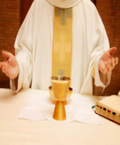 An essential work of priests is to bless. What exactly does this blessing mean? In the first place, priests of God bless God. They acknowledge the great and good things that God has done, especially our salvation in Jesus Christ by the power of the Holy Spirit. Priests remind us, in other words, that we live in a world of grace, a world blessed by God.
An essential work of priests is to bless. What exactly does this blessing mean? In the first place, priests of God bless God. They acknowledge the great and good things that God has done, especially our salvation in Jesus Christ by the power of the Holy Spirit. Priests remind us, in other words, that we live in a world of grace, a world blessed by God.
Priests also bless the people of God and some objects as well. In blessing people and objects, priests invoke or call on God to be present. They ask that God would be present to his people so that they can be healed and find strength for their journey. They ask God to bless the objects that are used to stir the devotion of people as they pray and remember the Lord and his saints. In all their blessings, priests remind us of the holiness of God, a holiness God shares with us, his sons and daughters.
May 31 - June 6, 2015 - SERVE
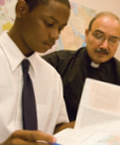 When Jesus speaks of his identity and mission as service, he says, “For the son of man came not to be served but to serve and to give his life as a ransom for the many.” (Mark 10:45) With these words, Jesus not only defined the meaning of his own service and that of all his followers, he also defined the service of those who would act in his name and in his person, the priests of his Church.
When Jesus speaks of his identity and mission as service, he says, “For the son of man came not to be served but to serve and to give his life as a ransom for the many.” (Mark 10:45) With these words, Jesus not only defined the meaning of his own service and that of all his followers, he also defined the service of those who would act in his name and in his person, the priests of his Church.
We often understand serving as doing favors for others or bestowing benefits on them. For Jesus and for those in Holy Orders - his bishops, priests, and deacons - serving goes much farther and much deeper. He defines his service as “giving his life as a ransom for the many,” in other words, his self gift in life-giving love for others. In the end, those in Holy Orders are called to a similar service that culminates in the self gift in lifegiving love for others in the Eucharistic sacrifice: This is my body given up for you. This is my blood.
May 24-30, 2015 - SURVIVE
 Across a lifetime, if we regularly participate in the Mass, we receive Holy Communion so many times that we can scarcely count them. And this is a very good thing. We keep returning to receive the Eucharist in order to survive. An old Latin hymn calls the Eucharist esca viatorum, which means “the food of travelers.” It is an apt description of this great and wonderful sacrament.
Across a lifetime, if we regularly participate in the Mass, we receive Holy Communion so many times that we can scarcely count them. And this is a very good thing. We keep returning to receive the Eucharist in order to survive. An old Latin hymn calls the Eucharist esca viatorum, which means “the food of travelers.” It is an apt description of this great and wonderful sacrament.
We find ourselves on the road of life, and a bumpy road it is. We encounter smooth paths but also rough patches. We go straight ahead at times, but we also need to make detours. The journey can be arduous. We need sustenance. We need what it takes to survive. And that is the Eucharist, the sacrament of sustaining love and hope. With the Eucharist, we can keep moving with the knowledge that we are loved. With the Eucharist, we can advance because we know that we have a holy destination. With the Eucharist, we can survive the journey.
May 17-23, 2015 - CHANGE
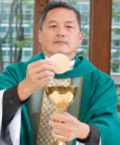 We believe that in the Mass, when the priest invokes the Holy Spirit and repeats the words of Jesus, the elements of bread and wine are changed into the reality of his Body and Blood. In faith, we can affirm that this happens, but we cannot explain with any precision how it happens, as much as we might want to. The how remains a mystery. And there is another important dimension of change that calls for our close attention.
We believe that in the Mass, when the priest invokes the Holy Spirit and repeats the words of Jesus, the elements of bread and wine are changed into the reality of his Body and Blood. In faith, we can affirm that this happens, but we cannot explain with any precision how it happens, as much as we might want to. The how remains a mystery. And there is another important dimension of change that calls for our close attention.
Not only do the elements of bread and wine change, but we who take within ourselves the Body and Blood of the Lord are radically transformed. Jesus says, “Those who eat my flesh and drink my blood have eternal life, and I will raise them up on the last day.” (John 6:54). The Eucharist changes us in the most radical way imaginable, from mortal beings subject to death to children of God raised up to new and eternal life.
May 10-16, 2015 - CONNECT
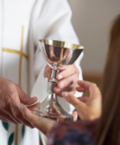 The Eucharist, we firmly believe, makes present to us the Body and Blood of the Lord in his self-sacrificing love. And by receiving him in Holy Communion, we connect ourselves with him. In fact, this is the sustaining and life-giving connection of our lives. The Eucharist enables us to have this personal connection with the Lord. It would be a mistake, however, to think that it stops here.
The Eucharist, we firmly believe, makes present to us the Body and Blood of the Lord in his self-sacrificing love. And by receiving him in Holy Communion, we connect ourselves with him. In fact, this is the sustaining and life-giving connection of our lives. The Eucharist enables us to have this personal connection with the Lord. It would be a mistake, however, to think that it stops here.
The Eucharist connects us not only with the Lord but with each other in him. That is the gist of Paul’s important words to the church in Corinth: “Because there is one bread, we who are many are one body, for we all partake of the one bread.” (1 Corinthians 10:17) Looking at our connection with other people through the Eucharist radically changes how we see our relationships, even our closest ones. We discover the depth and power of those relationships because we are connected in him who holds all of us in his love.
May 3-9, 2015 - LIVE
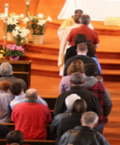 We don’t think of going to Mass on Sunday as a matter of life or death, but it is. We depend entirely on the Eucharist to be alive and to stay alive. Jesus himself says, “Whoever eats this bread will live for ever.” (John 6:51) And later he says that those who do not eat his flesh or drink his blood “have no life” in them.
We don’t think of going to Mass on Sunday as a matter of life or death, but it is. We depend entirely on the Eucharist to be alive and to stay alive. Jesus himself says, “Whoever eats this bread will live for ever.” (John 6:51) And later he says that those who do not eat his flesh or drink his blood “have no life” in them.
We can often fool ourselves about what sustains us. We might think, for example, that it is our work, or our relationships, or even our entertainments. These things may keep us alive but only partially. The ultimate, complete, and true source of our life is Jesus, our bread of life. Only when we are sustained by him can we make sense of our life overall. And then we not only live, but we live wisely.
April 26 - May 2, 2015 - SEAL
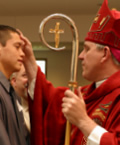 The Rite of Confirmation contains these essential words for the conferral of the sacrament: “Be sealed with the Gift of the Holy Spirit.” The exact meaning of these words may elude us. What does it mean to be sealed with the gift of the Holy Spirit? To seal something can often mean to enclose it, but clearly that is not the meaning of Confirmation. Another meaning is to certify or to guarantee. When something is sealed or has a seal affixed to it, we know that it is real and genuine.
The Rite of Confirmation contains these essential words for the conferral of the sacrament: “Be sealed with the Gift of the Holy Spirit.” The exact meaning of these words may elude us. What does it mean to be sealed with the gift of the Holy Spirit? To seal something can often mean to enclose it, but clearly that is not the meaning of Confirmation. Another meaning is to certify or to guarantee. When something is sealed or has a seal affixed to it, we know that it is real and genuine.
As we try to follow Jesus and live his way of discipleship, we may be uncertain. And we should be, especially if we are relying on ourselves and our own efforts. In fact, when we are his confirmed disciples on whom the seal of the Holy Spirit has been set, we can be absolutely certain. We live and walk, not on our own, but by the grace and power of the Holy Spirit.
April 19-25, 2015 - SUFFER
 The Martyrology is a thick book that contains entries for every day of the year. Each day lists the men and women, boys and girls across two thousand years who have given their lives in witness to their faith in Jesus Christ. It is an impressive assembly of countless witnesses to the faith.
The Martyrology is a thick book that contains entries for every day of the year. Each day lists the men and women, boys and girls across two thousand years who have given their lives in witness to their faith in Jesus Christ. It is an impressive assembly of countless witnesses to the faith.
Most probably, we will not be called to shed our blood in witness to our faith. We will, most definitely, have to suffer in some way because of our faith in Jesus Christ. In the Gospels, Jesus clearly tells his disciples that there is a cost in following him. Of course, they will be joyful and full of hope in him, but they will also endure the difficulties of misunderstanding, contempt, perhaps even persecution. In short, suffering is an inevitable part of discipleship. To support us in our suffering, he gives us his Holy Spirit in the sacrament of Confirmation.
April 12-18, 2015 - SEND
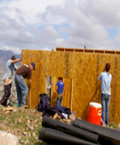 As each of the four Gospels ends, Jesus sends his disciples into the world. They are on a mission. They have a purpose. And that mission and purpose is to continue what he has begun. When we realize that Jesus sends not only his first disciples but us as well to continue his work as his disciples today, we stand amazed and overwhelmed by the scope of our calling. But we are not alone.
As each of the four Gospels ends, Jesus sends his disciples into the world. They are on a mission. They have a purpose. And that mission and purpose is to continue what he has begun. When we realize that Jesus sends not only his first disciples but us as well to continue his work as his disciples today, we stand amazed and overwhelmed by the scope of our calling. But we are not alone.
The Holy Spirit of Pentecost empowered the first disciples to begin their mission to carry the mission of Jesus to the ends of the earth. That same Holy Spirit enables us through the sacrament of Confirmation to take up and effectively fulfill the great task entrusted to us. The Lord Jesus truly sends us but not without the grace to fulfill our mission. He sends us, his confirmed disciples, in the Holy Spirit.
April 5-11, 2015 - STRENGTHEN
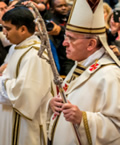 The very word confirm means to strengthen or to make stronger. Baptism gives us new life in Christ and makes us sons and daughters of God in the Son, Jesus Christ. Confirmation strengthens us in that identity with another outpouring of the Holy Spirit. Even more, Confirmation makes us stronger to live out that identity.
The very word confirm means to strengthen or to make stronger. Baptism gives us new life in Christ and makes us sons and daughters of God in the Son, Jesus Christ. Confirmation strengthens us in that identity with another outpouring of the Holy Spirit. Even more, Confirmation makes us stronger to live out that identity.
As we walk through this world, we often feel pulled in many directions. There are many forces, some good but many quite negative, that press in on us. How will we respond? Will we feel overwhelmed and unable to do anything? From what can we draw the strength and courage to make the right decisions, to stay on course, and to follow through on our commitments? For believers who have been confirmed in the Holy Spirit, the answer lies in the strengthening that is already within us. Faith alerts us to the precious and graced resource that we carry within ourselves.
March 29 - April 4, 2015 - TAKE IN
 Individual Christians are never meant to be closed in on themselves. Jesus says, “Love one another as I have loved you.” In effect, the disciples of Jesus live lives open to others. The same is true for Christian families built on the foundations of the sacrament of Marriage. These families, if they are to be true to their Christian identity, are centers of hospitality. They take in others. They receive them and support them. They make a space, especially for those who are most in need.
Individual Christians are never meant to be closed in on themselves. Jesus says, “Love one another as I have loved you.” In effect, the disciples of Jesus live lives open to others. The same is true for Christian families built on the foundations of the sacrament of Marriage. These families, if they are to be true to their Christian identity, are centers of hospitality. They take in others. They receive them and support them. They make a space, especially for those who are most in need.
Taking in others and caring for them, of course, does not mean that families are disrupted or meant to be without their own integrity. It does mean that every family has a mission that it must discover. This mission is to be a receiving presence in this world, whether that is in a soup kitchen or through adoption or more direct care of relatives in need. In every case, the Christian family lives beyond itself.
March 22-28, 2015 - CREATE
 To create in a strict philosophical and theological sense means to make something out of nothing. And that is true but incomplete. God made the world out of nothing, as the opening chapters of the Book of Genesis clearly state. There is another side to creation, however, that is not the province of philosophers but of poets. Dante Alighieri in the Divine Comedy wrote about the love that made the stars. Creation happens because of love.
To create in a strict philosophical and theological sense means to make something out of nothing. And that is true but incomplete. God made the world out of nothing, as the opening chapters of the Book of Genesis clearly state. There is another side to creation, however, that is not the province of philosophers but of poets. Dante Alighieri in the Divine Comedy wrote about the love that made the stars. Creation happens because of love.
Marriage, of course, is ordered toward the creation of new life. Spouses cooperate with the Creator, and the result is new life in this world. And be clear about this - the new life that comes from the marital union of a man and a woman is not merely the product of a biological process. It begins and ends in love, human love, certainly, and - even more certainly - divine love.
March 15-21, 2015 - STAND OUT
 Most people probably consider a marriage that takes faith and religion seriously as a matter of quiet and private domesticity. In fact, the opposite is true. People truly living the sacrament of Marriage stand out not only in the crowd but in the world at large. Exactly because it is a sacrament, marriage is a public sign. A sacramental couple gives effective and practical witness to the presence of God’s love in this often loveless world. They affirm enduring love in a world in which love seems shaped by transitory feelings, which make it disappear with ease. They are life-givers in a world that seems only to prize personal satisfaction. Sacramental couples do, indeed, stand out.
Most people probably consider a marriage that takes faith and religion seriously as a matter of quiet and private domesticity. In fact, the opposite is true. People truly living the sacrament of Marriage stand out not only in the crowd but in the world at large. Exactly because it is a sacrament, marriage is a public sign. A sacramental couple gives effective and practical witness to the presence of God’s love in this often loveless world. They affirm enduring love in a world in which love seems shaped by transitory feelings, which make it disappear with ease. They are life-givers in a world that seems only to prize personal satisfaction. Sacramental couples do, indeed, stand out.
The witness value of the sacrament of Marriage is extraordinary, precisely because marriage and family life are embedded in the ordinary. It’s not in heroics but in the routines of life that a sacramental marriage becomes a window to the heart of God.
March 8-14, 2015 - STAY
 “I promise to be true to you in good times and in bad, in sickness and in health. I will love you and honor you all the days of my life.” This is an impressive promise. In essence, it is a promise to stay with each other, whatever the circumstances of life. This is not an easy promise to make, nor is it an easy promise to keep. For those who enter marriage as more than a human covenant but as a sacrament, the promise takes on special meaning.
“I promise to be true to you in good times and in bad, in sickness and in health. I will love you and honor you all the days of my life.” This is an impressive promise. In essence, it is a promise to stay with each other, whatever the circumstances of life. This is not an easy promise to make, nor is it an easy promise to keep. For those who enter marriage as more than a human covenant but as a sacrament, the promise takes on special meaning.
When a baptized man and a baptized woman promise in faith to stay with each other, they draw their inspiration and their power from Jesus Christ. “And remember, I am with you always, to the end of the age,” he says at the very end of Matthew’s Gospel (28:20). Elsewhere, he says, “I will not leave you orphaned.” (John 14:18). The grace of permanence in marriage is truly a grace, not a human achievement.
March 1-7, 2015 - PLEDGE
 To pledge is to promise. And at the heart of the sacrament of Marriage are promises made and promises kept. Notice, however, that there is something very special about the pledging or promising that belongs to marriage. Usually, promises are about doing something or keeping something. In marriage, it is different. A man and a woman pledge and promise themselves. It couldn’t be more personal. They give not something but themselves to each other.
To pledge is to promise. And at the heart of the sacrament of Marriage are promises made and promises kept. Notice, however, that there is something very special about the pledging or promising that belongs to marriage. Usually, promises are about doing something or keeping something. In marriage, it is different. A man and a woman pledge and promise themselves. It couldn’t be more personal. They give not something but themselves to each other.
Now we know how fragile our human pledges and promises can be. In the sacrament of Marriage, when a couple pledges themselves to each other, they wrap that promise in faith in God who will sustain the union and keep them faithful. Human pledges and promises are full of risks and unknowns. What makes them real and possible is a love that is more than human. It is God’s sustaining love.
February 22-28, 2015 - REPAIR
 In the Sacrament of Penance, the priest offers what is called a “penance,” usually a prayer or action. It is nothing severe or difficult to do. But don’t think that it is of little importance. In fact, it’s very important.
In the Sacrament of Penance, the priest offers what is called a “penance,” usually a prayer or action. It is nothing severe or difficult to do. But don’t think that it is of little importance. In fact, it’s very important.
The penance is a small way to begin to repair the damage of sin. We confess our sins, and we receive absolution, the forgiveness of those sins. Still, the residue or consequences of sin remain. If we have been unjust or unkind, we need to repair the damage. If we have succumbed to habits that diminish us, we need to repair the damage. If we have ignored the needs of others, we need to repair the damage. The penance reminds us that a converted and forgiven heart will claim responsibility and then move forward. The penance may be a short prayer or a small action, but do not underestimate its value.
February 15-21, 2015 - FREE UP
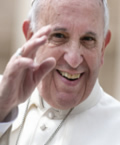 “The priest absolves your sins,” the catechist tells her class of seven-year-olds. They accept it but, of course, don’t understand it. Maybe some of us older folks don’t quite get it either. The meaning behind this uncommon word is actually pretty simple. To absolve is to free up. We could use other words as well, such as to forgive, to unknot, to undo, or to release.
“The priest absolves your sins,” the catechist tells her class of seven-year-olds. They accept it but, of course, don’t understand it. Maybe some of us older folks don’t quite get it either. The meaning behind this uncommon word is actually pretty simple. To absolve is to free up. We could use other words as well, such as to forgive, to unknot, to undo, or to release.
The great grace and result of the Sacrament of Penance is that sin no longer has a hold on us. What has trapped us and tied us up is dissipated. We find ourselves freed up. And the freedom we experience is genuine freedom, not just the freedom to do whatever we want but the real freedom to be who we truly are - God’s beloved sons and daughters.
February 8-14, 2015 - TELL
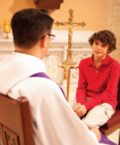 We were probably very young at the time of our first confession. Inevitably, someone - a teacher or a parent - told us, “Tell your sins to the priest.” Ever since that time, we may have been reluctant or we may have been relieved, but we have always known what we must do. We must tell our sins. Perhaps we have never quite grasped the reason for telling our sins. Actually, it’s pretty simple.
We were probably very young at the time of our first confession. Inevitably, someone - a teacher or a parent - told us, “Tell your sins to the priest.” Ever since that time, we may have been reluctant or we may have been relieved, but we have always known what we must do. We must tell our sins. Perhaps we have never quite grasped the reason for telling our sins. Actually, it’s pretty simple.
When we tell our sins, we honestly own what we have done and what we have failed to do. When we tell our sins, we let them go into God’s merciful hands. When we tell our sins, we acknowledge the next steps we must take, where we must go.
Finally, we understand. This is not about embarrassment. It’s about freedom and change. And that is the work of God’s grace.
February 1-7, 2015 - WAKE UP
 At a certain low point in the story of the now-destitute prodigal son, he wakes up to his situation. The text reads: “But when he came to himself, he said, ‘How many of my father’s hired hands have bread enough and to spare, but here I am dying of hunger! I will get up and go to my father” (Luke 15:17–18).
At a certain low point in the story of the now-destitute prodigal son, he wakes up to his situation. The text reads: “But when he came to himself, he said, ‘How many of my father’s hired hands have bread enough and to spare, but here I am dying of hunger! I will get up and go to my father” (Luke 15:17–18).
In the Sacrament of Penance, we ask God for forgiveness that he gladly and generously gives to us. A very first step, however, is waking up to our situation and realizing how much we need God’s mercy. The habits of sin may dull our minds and hearts. We may be sluggish in reflecting on our lives. Whatever numbs us must dissipate. We do need to wake up, and then with the prodigal son we can get up and go to our father.
January 25-31, 2015 - DWELL
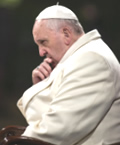 In the Scriptures, we find a cluster of similar and important words - dwell, stay, abide, and remain. They all point to a single reality. In the rite of Baptism, water was poured on us. Even more significantly, as Saint Paul says, “God’s love has been poured into our hearts through the Holy Spirit that has been given to us.” (Romans 5:5) Deep within us, then, in our hearts, God dwells within us by the power of the Holy Spirit.
In the Scriptures, we find a cluster of similar and important words - dwell, stay, abide, and remain. They all point to a single reality. In the rite of Baptism, water was poured on us. Even more significantly, as Saint Paul says, “God’s love has been poured into our hearts through the Holy Spirit that has been given to us.” (Romans 5:5) Deep within us, then, in our hearts, God dwells within us by the power of the Holy Spirit.
The presence of God dwelling within us through Baptism signals the absolute closeness we enjoy with God. And God’s indwelling presence is reliable. He is always faithful, even if we are not. He stays with us and stands by us. Finally, this presence of God dwelling in us in sacrament and mystery is a foretaste of our future. Our hope and our destiny is that we will dwell in God and God in us, when we see God face-to-face.
January 18-24, 2015 - FREE
 We know that Baptism unites us with Christ in his dying and rising. We know that because of our union with him, we are God’s beloved daughters and sons in the Son. And besides all this, because Christ is our life through Baptism, something else happens. He sets us free from the two most enslaving and burdensome realities of our lives. He frees us from sin and death.
We know that Baptism unites us with Christ in his dying and rising. We know that because of our union with him, we are God’s beloved daughters and sons in the Son. And besides all this, because Christ is our life through Baptism, something else happens. He sets us free from the two most enslaving and burdensome realities of our lives. He frees us from sin and death.
Sin entraps us, usually within ourselves. And on our own, we cannot break free. Death and the impending sense of doom and loss it brings seem to box us into the narrow confines of our very short earthly lives. Baptism loosens the grip of sin through forgiveness, and it loosens the grip of death through new and eternal life in Christ Jesus. We are free to be who we really and truly are - the children of God.
January 11-17, 2015 - UNITE
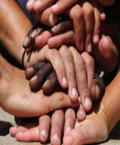 The great and sad effect of Original Sin is that it separated us from God and from each other. The great and wonderful grace of baptism is that it unites us with Christ and each other. Recall what Saint Paul says, “All of us who have been baptized into Christ Jesus were baptized into his death… For if we have been united with him in a death like his, we will certainly be united with him in a resurrection like his.” (Romans 6:3,5)
The great and sad effect of Original Sin is that it separated us from God and from each other. The great and wonderful grace of baptism is that it unites us with Christ and each other. Recall what Saint Paul says, “All of us who have been baptized into Christ Jesus were baptized into his death… For if we have been united with him in a death like his, we will certainly be united with him in a resurrection like his.” (Romans 6:3,5)
Baptism unites us to Christ, and that means that his destiny and ours are intertwined. If we want to see how our life will unfold or ought to unfold, we look to him. If we want to see the path that we must traverse, we watch the road that he traveled. Really, the key to our life is given to us in our Baptism. That key is our union with him who is our hope.
January 4-10, 2015 - NAME
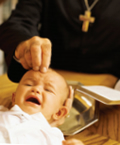 When Jesus is baptized in the Jordan River, a voice from heaven says, “You are my beloved son in whom I am well pleased.” Jesus’ heavenly Father names him and identifies him as his beloved son. Our own Baptism is also a naming. By tradition, we receive our names at Baptism, the identity tag that stays with us across a lifetime. There is, however, something more and something much deeper at work than getting a tag.
When Jesus is baptized in the Jordan River, a voice from heaven says, “You are my beloved son in whom I am well pleased.” Jesus’ heavenly Father names him and identifies him as his beloved son. Our own Baptism is also a naming. By tradition, we receive our names at Baptism, the identity tag that stays with us across a lifetime. There is, however, something more and something much deeper at work than getting a tag.
In our Baptism we not only receive our proper names, but we are also, like Jesus, named God’s beloved sons and daughters. And this means far more than a name that appears on a driver’s license or passport. This is the identity that we cling to, and do so for dear life. For you see, nothing about us matters as much as that we belong to God - not just as his creatures or his dependents but really and truly as what we are named, beloved daughters and sons.
December 28, 2014 - January 3, 2015 - CRY
 Infants cry. We all know it. In their vulnerability, they let us know that they need nourishment or need to be held. We know that this is true of the newborn Jesus. The Eternal Word made flesh shares the human vulnerability of every other infant on earth. And this infant vulnerability - their need and their smallness - draws us close to them.
Infants cry. We all know it. In their vulnerability, they let us know that they need nourishment or need to be held. We know that this is true of the newborn Jesus. The Eternal Word made flesh shares the human vulnerability of every other infant on earth. And this infant vulnerability - their need and their smallness - draws us close to them.
We may grow up, but we never leave behind our fundamental vulnerability. In different ways, we continue to cry for sustenance, for mercy, for strength, for healing, and for connection and communion. In our vulnerability, God draws close to us, as Scripture says, with bands of love. When our deepest needs and vulnerabilities prompt us to cry, the Lord draws us to himself through sacramental signs and rituals. He hears our every cry, and the sacraments of the Church tell us that this is true.
December 21-27, 2014 - NOD
 If we speak and our listener nods her head, we know that she has accepted what we say. We know that there is agreement. At the heart of the story of Advent and Christmas, we know that we are called to nod to God’s Word. God would not enter this world unwelcomed. God looks for our nod. And so, the Blessed Virgin Mary stands for all humanity and nods to the Lord, “Let it be done to me according to your word.” Then the Word becomes flesh and dwells among us.
If we speak and our listener nods her head, we know that she has accepted what we say. We know that there is agreement. At the heart of the story of Advent and Christmas, we know that we are called to nod to God’s Word. God would not enter this world unwelcomed. God looks for our nod. And so, the Blessed Virgin Mary stands for all humanity and nods to the Lord, “Let it be done to me according to your word.” Then the Word becomes flesh and dwells among us.
We believe that the sacraments bring us the presence of the living Christ. And we also believe that his presence is never imposed. As we receive the sacraments, the Lord looks for us to nod to him and to welcome his sacramental presence with hearts full of faith.
December 14-20, 2014 - LOOK AHEAD
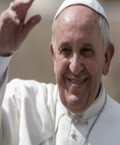 The fundamental prayer of Advent is a steady beat of “Come, Lord Jesus.” Together, we look ahead to that day when the Lord Jesus will return in glory to bring us together in the kingdom that he will present to his Father. We look ahead to the end of our pilgrimage. We anticipate our destiny in the holy season of Advent.
The fundamental prayer of Advent is a steady beat of “Come, Lord Jesus.” Together, we look ahead to that day when the Lord Jesus will return in glory to bring us together in the kingdom that he will present to his Father. We look ahead to the end of our pilgrimage. We anticipate our destiny in the holy season of Advent.
In so many ways, each time we celebrate the sacraments, we also look ahead. The sacraments are signs that point to the presence of the living Christ in our midst right now. The sacraments also point ahead to our destiny. Baptism, for example, makes us sons and daughters in the Son, Jesus Christ. It gives us a glimpse of the glorious inheritance and destiny that will fully and completely be ours one day, when we see God face-to-face. Our Holy Communion now looks ahead to the heavenly banquet in our Father’s house.
December 7-13, 2014 - LOOK OUT
 Nothing gets surer or quicker attention than hollering, “Look out!” The words alert others, perhaps to some impending danger. We may not see a car coming or a box about to crash down. And when we hear those words, we do look out. We see something that we didn’t notice before.
Nothing gets surer or quicker attention than hollering, “Look out!” The words alert others, perhaps to some impending danger. We may not see a car coming or a box about to crash down. And when we hear those words, we do look out. We see something that we didn’t notice before.
In Advent, the prophets, especially Isaiah and John the Baptist, cry, “Look out! Be aware. Notice what is happening and what is about to happen.” They are the voices of Advent that grab our attention. The sacraments, too, are signs that speak to us and call for our attention. Whether it is the Eucharist or Penance or any other sacrament, they alert us to realities that we may not notice - the presence of the Lord, the possibility of mercy, or the visibility of God’s love in a married couple’s life together. Listen to the voices of Advent. And then look out for and listen to for the sacramental signs around us.
November 30 - December 6, 2014 - LISTEN
 “Are you listening to me?” How many times do parents ask their children this question? More than they can count. The question, even if asked out of frustration, is a way to help children learn not only to hear but to pay attention. Learning to listen and to pay attention is a lifelong task, especially for the deepest things of life that involve God’s call and promise.
“Are you listening to me?” How many times do parents ask their children this question? More than they can count. The question, even if asked out of frustration, is a way to help children learn not only to hear but to pay attention. Learning to listen and to pay attention is a lifelong task, especially for the deepest things of life that involve God’s call and promise.
The prophets of Advent, the Church’s worship, and our sacramental celebrations alert us and teach us to listen and to really pay attention to God. The messages are of the utmost importance - God is close, we need to change, and hope is our inheritance.
God is saying to us in so many ways, “Are you listening to me?” Well, are we?
November 23-29, 2014 - FOLLOW
 At Baptism, Saint Paul says we died with Christ to rise with him. We went down with him into the waters that symbolized our death, and then we rose up with him to new life. We follow Christ into the tomb, and we follow him into a resurrection like his. Our following at Baptism was sacramental, in sign and symbol. One day, we will follow him in the reality of our own death, and we will pass over with him to the fullness of life. Now, at the moment of our death, it is no longer in sign and symbol but rather in the realities they signify.
At Baptism, Saint Paul says we died with Christ to rise with him. We went down with him into the waters that symbolized our death, and then we rose up with him to new life. We follow Christ into the tomb, and we follow him into a resurrection like his. Our following at Baptism was sacramental, in sign and symbol. One day, we will follow him in the reality of our own death, and we will pass over with him to the fullness of life. Now, at the moment of our death, it is no longer in sign and symbol but rather in the realities they signify.
We hear the words of Jesus: “Whoever serves me must follow me, and where I am, there will my servant be also” (Jn 12:26). We do follow him in the sacraments, with our daily discipleship, and - at the end of our lives - in trusting surrender.
November 16-22, 2014 - ENTRUST
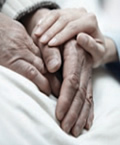 As we gather around the bedside of our dying loved ones, we entrust them to the Lord. We can do no more. At some point, although medicine can offer some comfort, it can no longer keep them alive. We face within ourselves and in our loved ones the poverty and dependence that has always marked our lives, even when we have not been conscious of it.
As we gather around the bedside of our dying loved ones, we entrust them to the Lord. We can do no more. At some point, although medicine can offer some comfort, it can no longer keep them alive. We face within ourselves and in our loved ones the poverty and dependence that has always marked our lives, even when we have not been conscious of it.
Now, we entrust them to God, to the saints, and to the angels. And when we do so, we acknowledge that we belong to a great communion of holy men and women and of spirits who serve the living God. What seems to be the most solitary, the loneliest moment of our lives, when we are dying, is rather a time of communion and connection. The whole Church in heaven and on earth gathers. The whole Church in this moment of entrustment is our great sacrament of communion in the Lord.
November 9-15, 2014 - WEEP
 In her funeral liturgies, the Church encourages us to walk and weep as Jesus did at the death of his friend Lazarus. We walk and weep when we bring the remains of our loved ones to the church for the funeral Mass and when we bear those remains to their final resting place.
In her funeral liturgies, the Church encourages us to walk and weep as Jesus did at the death of his friend Lazarus. We walk and weep when we bring the remains of our loved ones to the church for the funeral Mass and when we bear those remains to their final resting place.
Our grieving and our tears do not belie our faith in the power of the Risen Lord. No, when we weep, we express our sense of loss and the sorrowful break that death imposes on us. More importantly, our mourning speaks to the incompleteness of our journey homeward to God. This grieving is like all the sacraments that are celebrated while we are on the way but not yet arrived. And so our sorrow then becomes a seed of hope and expectation that the Lord, forever true to his promise, will come with glory for his people and complete our journey.
November 2-8, 2014 - OFFER
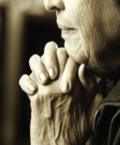 Across a lifetime, we celebrate the sacrifice of the Mass many times. Every time we do so, we join ourselves to Jesus and offer ourselves to God and become one with the self-sacrificing love of Jesus. The repetition of this self-offering is meant to train us.
Across a lifetime, we celebrate the sacrifice of the Mass many times. Every time we do so, we join ourselves to Jesus and offer ourselves to God and become one with the self-sacrificing love of Jesus. The repetition of this self-offering is meant to train us.
One day, at the end of our lives, as we lie dying and conclude our journey on earth, we will make our final offering to God. We will celebrate our personal liturgy of sacrifice and surrender. We will have learned from a lifetime of participation in the Eucharist how to entrust ourselves entirely, lovingly, and confidently into the hands of God. We will, with God’s help, make an offering of ourselves and worship God in spirit and in truth. We will, with Jesus prompting us, say those great words he spoke from the cross, “Father, into your hands I commend my spirit.”
October 26 - November 1, 2014 - RAISE
 When the priest celebrating the Anointing of the Sick anoints the hands of the sick person, he prays: “May the Lord who frees you from sin save you and raise you up.” These words echo the Letter of James: “The prayer of faith will save the sick, and the Lord will raise them up.” (James 5:15) There are no qualifications or conditions. The Letter of James says simply that the Lord will indeed raise them up.
When the priest celebrating the Anointing of the Sick anoints the hands of the sick person, he prays: “May the Lord who frees you from sin save you and raise you up.” These words echo the Letter of James: “The prayer of faith will save the sick, and the Lord will raise them up.” (James 5:15) There are no qualifications or conditions. The Letter of James says simply that the Lord will indeed raise them up.
What is this assured “raising up”? When we pray over a seriously ill loved one, we want them cured. We look for God to raise them up by restoring them to health and to us. But when God raises us up, he does not only restore us, he transforms us. Restoration may or may not be part of God’s action. What is absolutely certain is that in God’s hands the sick person is drawn into new life, God’s life.
October 19-25, 2014 - WAIT
 As we pray for the sick, even as we celebrate the sacrament of the Anointing of the Sick, we keep watch with them. We wait with them. Our waiting, however, is not just watching time pass by. Our waiting is full of expectation. Even - and perhaps especially - when the outcome of an illness is uncertain, we hold on to hope. We do not know with precision how everything will unfold, but we do know and believe that everything is in God’s loving and provident hands.
As we pray for the sick, even as we celebrate the sacrament of the Anointing of the Sick, we keep watch with them. We wait with them. Our waiting, however, is not just watching time pass by. Our waiting is full of expectation. Even - and perhaps especially - when the outcome of an illness is uncertain, we hold on to hope. We do not know with precision how everything will unfold, but we do know and believe that everything is in God’s loving and provident hands.
Our waiting is not merely waiting for something to happen. Our waiting is for God to act. Our waiting follows the Psalmist’s advice: “Then wait for the Lord, keep to God’s way.” (Psalm 37:34)
The Anointing of the Sick is, of course, a sacrament of healing. It is also a sacrament of our great expectation that God directs our lives, especially when we seem to be most fragile and most in need.
October 12-18, 2014 - CARRY
 In Mark’s Gospel (2:1-12), four men carry their paralyzed friend to Jesus. Jesus sees their faith, forgives the man’s sins, and heals him. This story needs to continue today. In faith, we carry one another to Jesus for healing and forgiveness. When we do this, we acknowledge our fragile human condition, our need for one another, and our shared faith that Jesus is our source of healing.
In Mark’s Gospel (2:1-12), four men carry their paralyzed friend to Jesus. Jesus sees their faith, forgives the man’s sins, and heals him. This story needs to continue today. In faith, we carry one another to Jesus for healing and forgiveness. When we do this, we acknowledge our fragile human condition, our need for one another, and our shared faith that Jesus is our source of healing.
The celebration of the Anointing of the Sick enables us to bring our friends in need to Jesus. We stand together with them in a communion of suffering and petition that becomes a communion of hope. We are never closer to God, Pope Francis continually reminds us, than when we stand close to those who are in special need - the sick, the poor, and all those who are on the margins of society.
After Jesus cures the paralyzed man in Mark’s Gospel, his friends say, “We have never seen anything like this!” May these words echo as we journey with the sick and poor.
October 5-11, 2014 - CRY
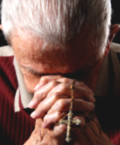 One of the most heartfelt Psalm-prayers of a sick person reads, “I cry at night before you. Let my prayer come into your presence. O turn your ear to my cry.” (Psalm 88:2–3) And, indeed, God does hear the cry of the poor sick person. The Anointing of the Sick is the sacramental assurance that God walks with us in our weakness and illness.
One of the most heartfelt Psalm-prayers of a sick person reads, “I cry at night before you. Let my prayer come into your presence. O turn your ear to my cry.” (Psalm 88:2–3) And, indeed, God does hear the cry of the poor sick person. The Anointing of the Sick is the sacramental assurance that God walks with us in our weakness and illness.
Those among us who are sick cry out to God, and they also cry out to us. When we celebrate the Anointing of the Sick with them, we assure them that we also walk with them. In our accompaniment of the sick, we follow Pope Francis, who urges us never to discard anyone, especially the poor, the sick, and the elderly. Our participation in this sacrament means that we hear their cry and affirm their value and dignity, especially in their vulnerability.
September 28 - October 4, 2014 - LINK
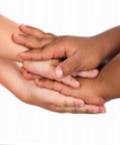 The Eucharist brings us to God, and it brings God to us. And there is more. The Eucharist also links us one to another in the mystery of Jesus Christ. What no politician, no military leader, no scientist has ever been able to accomplish - to link humanity across all the boundaries of race, culture, and way of life - all that happens for us each time we gather to celebrate the Eucharist.
The Eucharist brings us to God, and it brings God to us. And there is more. The Eucharist also links us one to another in the mystery of Jesus Christ. What no politician, no military leader, no scientist has ever been able to accomplish - to link humanity across all the boundaries of race, culture, and way of life - all that happens for us each time we gather to celebrate the Eucharist.
Even if I am not entirely aware of it, I am connected with people across the globe who share “the one bread and the one cup,” as Saint Paul describes the Eucharist. In this simple act of worship, we have the powerful seed of human solidarity. In the Eucharist, we hold our imagined future as one humanity, an imagined future that even now is becoming a reality.
The linking that happens in the Eucharist becomes a source of encouragement for us as well as a sign of our responsibility.
September 21-27, 2014 - POUR
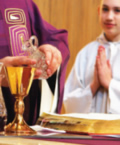 Great and momentous words are pronounced in the name of Jesus during the Mass. We hear, “This is the chalice of my blood, the blood of the new and eternal covenant which will be poured out for you and for many for the forgiveness of sins.”
Great and momentous words are pronounced in the name of Jesus during the Mass. We hear, “This is the chalice of my blood, the blood of the new and eternal covenant which will be poured out for you and for many for the forgiveness of sins.”
The blood poured out on the cross is the very life of Jesus. And he pours out his life’s blood so that we may have life. Our path to life, however, must necessarily include the forgiveness of our sins, which rob us of the breath of God and leave us lifeless. The healing blood of Jesus enables us to find forgiveness, to leave sin behind, and to embrace God’s very own life within us.
What we could never do on our own, God has done in and through the blood of his only-begotten son. And we, at Mass, stand before this unimaginably great and generous gift poured out for us.
September 14-20, 2014 - REMEMBER
 The Eucharist we celebrate is the memorial of the death and the resurrection of the Lord. We remember. We do not just recall his death and resurrection. We remember it in such a way - by the power of the Holy Spirit - that his death and resurrection are really and truly present to us.
The Eucharist we celebrate is the memorial of the death and the resurrection of the Lord. We remember. We do not just recall his death and resurrection. We remember it in such a way - by the power of the Holy Spirit - that his death and resurrection are really and truly present to us.
This great act of memory heals us and gives us life. We carry within ourselves so many memories, and not all of them are good. We know well enough the memories of past sins, of hurts, of deferred dreams, and of damaged relationships. These “broken memories” threaten to subvert our lives and, sometimes, even to enslave us.
When we remember in our celebration of the Eucharist the saving death and resurrection of the Lord, we meet the pure and transforming mercy of God. Our memories are healed. Our hearts find rest in the one who is our hope.
September 7-13, 2014 - TOUCH
 When we receive the Eucharist, we believe that we receive Jesus Christ into our lives. Although we read these words and agree with them, we may not fully realize their impact.
When we receive the Eucharist, we believe that we receive Jesus Christ into our lives. Although we read these words and agree with them, we may not fully realize their impact.
Whether we receive Holy Communion in the hand or on the tongue, something extraordinary happens. Jesus touches us, and we touch Jesus. In and through the sacramental sign, the divine, healing, and loving touch of Jesus takes hold of us. It is like the intimate embrace of a mother and child or of two spouses who deeply love each other - but even more so.
When Jesus touches us and we reach out to touch him, our contact with him changes us entirely. We know ourselves as loved, healed, and united with him and one another. His touch is our healing and communion.
August 31 - September 6, 2014 - SHAPE
 We Catholics say things like this all the time: get the baby baptized, get married, and-even-get ordained. The getting speaks of a momentary ritual, holy no doubt but then finished. After you get something, you’ve got it. But there is a mistake in thinking about the sacraments this way. We don’t get them as much as they get us. What do I mean?
We Catholics say things like this all the time: get the baby baptized, get married, and-even-get ordained. The getting speaks of a momentary ritual, holy no doubt but then finished. After you get something, you’ve got it. But there is a mistake in thinking about the sacraments this way. We don’t get them as much as they get us. What do I mean?
The sacraments surely have a focused ritual moment, but they also lead us beyond the moment. The sacraments are meant to shape the way we live. From the moment we are baptized or married or ordained or whatever sacrament we celebrate, that particular sacrament ushers us into a new way of living. It begins - if we are open and responsive to it - a new and fresh pattern of life as a disciple of Jesus or as a sign of God’s love in the world or as a shepherd extending the Good Shepherd’s care. Clearly, God’s creative hand is here at work in our lives.
August 24-30, 2014 - RENEW
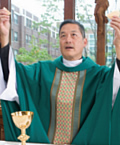 Life can wear us down. Our spirits can sag. We may feel caught in habits - sometimes sinful ones - that erode our confidence and hope. Our perspectives narrow and generosity becomes more and more of a stretch for us.
Life can wear us down. Our spirits can sag. We may feel caught in habits - sometimes sinful ones - that erode our confidence and hope. Our perspectives narrow and generosity becomes more and more of a stretch for us.
Come to me, Jesus says, all you who find life wearisome and who carry heavy burdens. Come, he says to us today, to the sacraments that renew you. Come to Penance, confess your sins, and receive forgiveness. Be relieved of the burden and find the courage and strength to live in a new way. Come to the Eucharist and find in the absolutely generous self-sacrificing love of Jesus - my body for you, my blood for you - a way to widen your love and feed your generosity.
The sacraments remember and make present the saving work of Jesus. They also offer us a breathtaking map of our renewed future that seemed to have eluded us
August 17-23, 2014 - OPEN
 Jesus said that we should earnestly try to enter by the narrow gate, the only passageway that leads to salvation. The Sacraments of Initiation - Baptism, Confirmation, and Eucharist - and most especially Baptism open the gate of salvation. By joining us in a real relationship with him who is the way and the truth and the life, these sacraments open the path to new and eternal life.
Jesus said that we should earnestly try to enter by the narrow gate, the only passageway that leads to salvation. The Sacraments of Initiation - Baptism, Confirmation, and Eucharist - and most especially Baptism open the gate of salvation. By joining us in a real relationship with him who is the way and the truth and the life, these sacraments open the path to new and eternal life.
If the forces of sin and death seemed at one time to conspire to hold us bound and even seemed to have the upper hand, we now stand in the wonder of the free children of God. We now have access to healing, forgiveness, and the fullness of life through the sacraments that bring Jesus, the redeemer, and his saving work into our lives. The narrow gate is now the open gate, and this gate is Jesus.
August 10-16, 2014 - MARK
 The sacraments mark us. Somehow, they make us different and never leave us the same as we were. Certain sacraments - Baptism, Confirmation, and Holy Orders - mark and shape our identity forever. We receive these sacraments only once, and that is once and forever. They impart what is called a “sacramental character” marking us off as belonging to Jesus Christ in Baptism, sealed by the Holy Spirit in Confirmation, and conformed to Jesus Christ, the head and shepherd of the Church, in Holy Orders.
The sacraments mark us. Somehow, they make us different and never leave us the same as we were. Certain sacraments - Baptism, Confirmation, and Holy Orders - mark and shape our identity forever. We receive these sacraments only once, and that is once and forever. They impart what is called a “sacramental character” marking us off as belonging to Jesus Christ in Baptism, sealed by the Holy Spirit in Confirmation, and conformed to Jesus Christ, the head and shepherd of the Church, in Holy Orders.
The other sacraments mark us on our ongoing journey of Christian discipleship as sustained by the sacrifice of Jesus and our union with him (Eucharist), as forgiven sinners (Penance), as healed (Anointing of the Sick), and as effective signs of God’s love and life-giving power in the world (Matrimony). Whether clearly obvious or subtly present, whether intensely felt or quietly present, the sacraments do mark us as disciples of Jesus Christ. And we are enriched.
August 3-9, 2014 - GATHER
 We do not go to God one by one. God has decided to gather us as his holy people in the Church, which is the Body of Christ. When we celebrate the sacraments, we do so as God’s Church.
We do not go to God one by one. God has decided to gather us as his holy people in the Church, which is the Body of Christ. When we celebrate the sacraments, we do so as God’s Church.
Even though our experience may be deeply, deeply personal, for example, when we confess our sins and receive forgiveness or feel the presence of Jesus in Holy Communion, our experience is never just ours alone. We are all a part of the Body of Christ, joined and built up together.
If God has decided to gather us as his people in the Church, then we are called to join that gathering. When we come together, for example, to celebrate the sacraments and worship God, we do so with generous and willing hearts. We support each other, pray for each other, and encourage each other. We also accept in faith the sacramental rituals and prayers entrusted to the Church.
July 27 - August 2, 2014 - HEAR
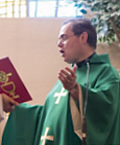 Every celebration of the sacraments begins with a proclamation of God’s Word from the Bible. We may take this for granted, but we need to understand why and how God’s Word is essential in our celebration of the sacraments.
Every celebration of the sacraments begins with a proclamation of God’s Word from the Bible. We may take this for granted, but we need to understand why and how God’s Word is essential in our celebration of the sacraments.
The Word of God tells us the most important truth of our lives. God’s Word, in the first place, tells us what God has done for us in Jesus Christ who died and rose for us so that we would be free of sin and death. Secondly, God’s Word tells us what God’s plan is for us, what is the promise and the hope that God offers us.
Once we hear and accept what God has done for us in Jesus Christ and once we hear the future God offers us, then we are ready to celebrate the sacraments. We are ready to meet the living and saving Lord Jesus. We are ready to embrace God’s promised future.
July 20-26, 2014 - MEET
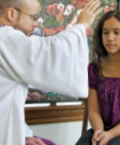 So many good men and women have gone before us. These brave and good people of history continue to inspire us by their example. We tell their stories to keep their memory alive and to allow them to continue to influence our lives. With Jesus, however, it is very different.
So many good men and women have gone before us. These brave and good people of history continue to inspire us by their example. We tell their stories to keep their memory alive and to allow them to continue to influence our lives. With Jesus, however, it is very different.
For believers, Jesus is not just an inspiring figure of past history. He is the living Lord who is really and truly present to us today in his word, in his Church, and in his sacraments. So, for example, when we celebrate the sacrament of Penance, Jesus does not merely inspire us with a sense of forgiveness. In fact, we meet the living Lord who forgives us through the ministry of the Church and her priests.
The sacraments offer us an unparalleled way to meet Jesus in and through the signs, the words, and the rituals of the Church. He comes so close to meet us, and that leaves us amazed and grateful.
July 13-19, 2014 - BELIEVE
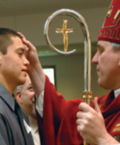 We know that sacraments bring us in contact with Jesus and his saving mysteries, but how exactly does that happen? First, we must be clear that there is nothing automatic or mechanical about the sacraments. The sacraments, for example, are never imposed on us. In fact, the opposite is true. We can only celebrate and receive the sacraments with a free and loving act of faith.
We know that sacraments bring us in contact with Jesus and his saving mysteries, but how exactly does that happen? First, we must be clear that there is nothing automatic or mechanical about the sacraments. The sacraments, for example, are never imposed on us. In fact, the opposite is true. We can only celebrate and receive the sacraments with a free and loving act of faith.
At the end of Mark’s Gospel, Jesus commissions his disciples to go into the whole world and proclaim the good news. Then he adds, “The one who believes and is baptized will be saved…” (Mark 16:16). From the very words of Jesus, we know the absolutely close link between faith and sacraments. Believers, people who have accepted the word of Jesus Christ proclaimed in the Church as true and who rely on that word, are the ones who celebrate and receive the sacraments. Then, in faith, the gifts and the graces of the sacraments take hold and change the lives of believers.
July 6-12, 2014 - HOLD
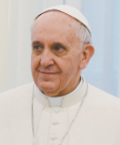 As we begin a year of reflection on the sacraments, we first need to be clear about what we mean. What exactly are the sacraments? How do we understand them? How can we explain them to others?
As we begin a year of reflection on the sacraments, we first need to be clear about what we mean. What exactly are the sacraments? How do we understand them? How can we explain them to others?
Sacraments are signs, seven different religious rituals which Jesus has given to his Church. Unlike other signs that just point something out, these sacramental signs bring us in direct contact with Jesus Christ who saves us. Here is another way to express the reality of the sacraments. They hold the mystery of Jesus Christ. The sacraments both contain and bring us close to Jesus Christ, true God and true man, the one who saves us from sin and death, the redeemer who gives us eternal life.
Pope Francis never tires of telling us how God has come close and touched us in Jesus Christ. The sacraments bring us directly into that experience. We are amazed and grateful.
